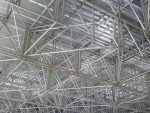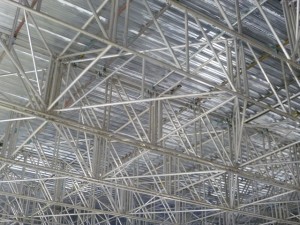- When my son asks “when will I ever have to know how to calculate the area of a triangle?” what do I say?
You could tell him, for one, that this might be the wrong question to be asking about his math homework, that while there is a good chance he won’t have a job where he has to do this precise calculation very often, that it’s nonetheless probably worth practicing it anyway, that it is worth getting a handle on how the calculation works, by manipulating a bunch of examples. The true value lies in practicing the application of calculative methods to abstract concepts.
Or if you wanted to be more specific, you might tell him that by breaking down a problem into its parts, identifying the right methods to solve those parts, and then fitting the solutions together, he is honing a skill set which will be necessary not only if he chooses a career in engineering, but also across a wide swath of both hands-on and math-heavy vocations; this description of the skill doubles as the basic task of those working computer science. If you were feeling sassy, you might mention that, beyond informing career options, identifying sub-problems and trying to reconcile solutions with one another also resonates with the analytical thrust necessary to the critique of political and philosophical arguments, therefore promises to develop more skeptical engagement with what is said in the media, not to mention that it spins cognitive wheels needed for the development and discovery of new perspectives on and forms of appreciation of art, film, dance, and music, and ultimately to creating a thoughtful approach to our own emotional lives, our relationships and our life choices.
If he was still listening, you might ask him to contemplate the common occurrence, in which one starts with a task that is somehow simultaneously boring and challenging, and becomes so familiar with its exercise that both the form of the problem and the nature of the solution becomes second nature. Attending to a task that is not inherently pleasant, fighting off distraction, overcoming the frustration that inevitably attends early efforts: all these are hard, but they come with a payoff. Taking a low-level skill from heartache to habit sets down a foundation for the pursuit of tasks that are in many cases innately more interesting (e.g. only by learning how to write in complete, grammatically correct sentences can you become capable of writing moving love letters). Measure twice, cut once may seem like a boring rule you have to force yourself to remember, until it simply becomes automatic in the way that the carpenter does her or his job—and an essential part of doing the job well. It turns out moreover, that the payoff is double, because while overcoming frustration and boredom are hard, one becomes better at them through practice. Even for the rarest of geniuses, the pleasures of virtuosity are built on a scaffolding of boredom, self-doubt, and frustration not only in their own field but across a variety of repetitive, basic tasks.
As for the triangles themselves, you might strongly put forward that building up a vocabulary of mathematical fundamentals offers an opportunity for your son to become a person, and to live a life, that he might not otherwise consider or have access to. Knowing, becoming familiar with, the universal relationships that govern the area and height, the angles, width and side lengths of every triangle means that each one takes on the gleam of an otherwise hidden meaning. Perhaps he’ll become the kind of person for whom those meanings (and the broader network of meanings of which they are a part) form a useful or interesting moment of his every day. Perhaps he won’t. But becoming familiar with those meanings—not just by plugging numbers into a formula, mind, but by learning how to manipulate the underlying ideas in ways that offers answers to questions—means he will have a choice, later on, about whether that’s a kind of person he wants to become, rather than being forced to choose a career and identity in which triangles, along with calculus, probability, and statistics remain mysteries whose secrets are the sole possession of others. There is beauty and power and magic in the abstract worlds of mathematics in which triangles are only one of the most basic inhabitants. You might ask if he really wants to decide so early on that he will never have reason to visit them.

